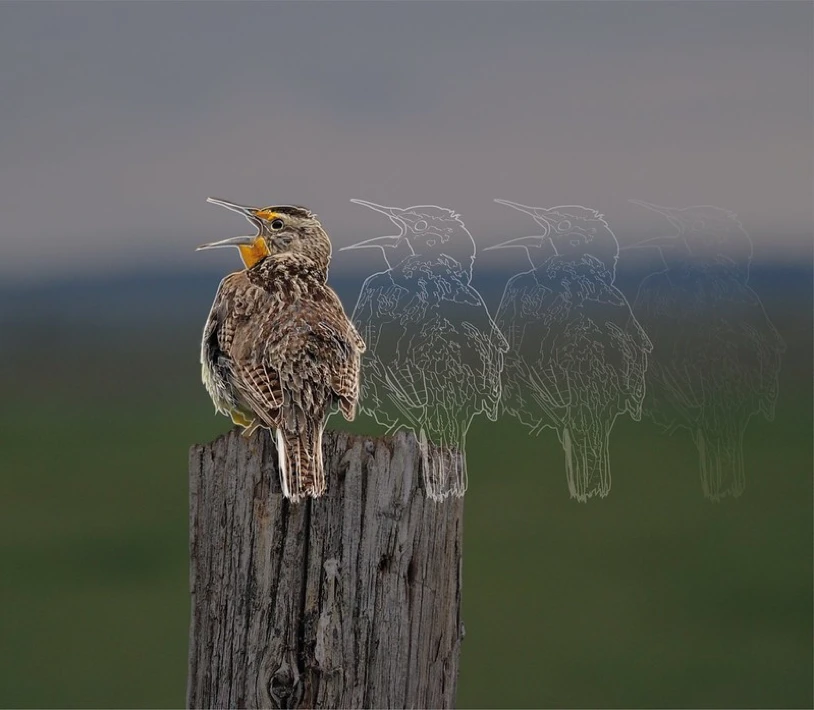
“Meadowlark,” Photo: Kristina Lauer / Artwork: Maggie Cooley
Presented with support from Arrow Street Arts and the Puffin Foundation
Directed by Debra Wise and David Keohane
Organizing Committee: Debra Wise, Joyce Van Dyke, Bill Marx, Mary Curtin, Deobrah Forston, David Keohane, Robert Lauer, Ellen Ryan
Featuring: John Kuntz, Eliza Fichter, David Keohane, Antje Duvekot, Regie Gibson, Bill Marx, Phillis Ewen, Zoe Halperin, Rhiannon Jenkins, Seth Glier, Debra Wise, The Red Rebel Brigade, Dr. Robert Lauer, Dr. Rose Abramoff, Dr. Johanna Ray Vollhardt, Dr. Nathan Phillips, Isaijah Shadrach, Zev Imani
Lobby Street Fair participants: Extinction Rebellion, Scientist Rebellion, 350 Mass, Beyond Plastic, Fore River Residents Against the Compressor Station, Stop Private Jet Expansion, All In Energy, Deborah Forston, Anne Loyer, Rick Dorff, Skip Schiel, Extinction Rebellion Art Working Group, Sara Peattie with The Puppeteers Cooperative
March 24 – 25, 2025
Arrow Street Arts
2 Arrow St., Cambridge, MA 02138.
Information here
Review by Maegan Bergeron-Clearwood
CAMBRIDGE, Mass. — As MC John Kuntz observes in his opening remarks, the American artistic community has been shamefully timid in its response to the topic of climate catastrophe, and Climate Crisis Cabaret: The Warm Up strives to fill this gap from a Boston-specific standpoint. Over the course of two hours, local artists and activists explore a full spectrum of responses to the issue at hand, from grief and despair to hope and resilience. The production is an admirable and necessary call to action, a reminder of the critical need for art in desperate political times.
Despite the breadth of themes and artistic mediums, however, the cabaret is strikingly homogenous in other areas, failing to represent the diversity of cultures and perspectives that make Boston, well, Boston. With a few impressive exceptions, the performances are largely interested in individual responses and solutions to climate catastrophe, undermining the cabaret’s purported focus on community.
The cabaret opens with Kuntz’ performance of a century-old monologue about deforestation from Anton Chekhov’s Uncle Vanya. From there, the acts are either introduced by Kuntz or bleed directly into each other, adding an element of surprise to an otherwise structurally conventional cabaret. Some of the performances would benefit from additional framing from the MC, but the overall effect is engaging, prompting spectators to make their own meaning from the out-of-context pieces.
Technically, the cabaret is pristine, with fluid, near-invisible transitions between acts. Directors Debra Wise and David Keohane take advantage of Arrow Street Arts’ intimate studio space, positioning the performers in a cozy corner of the curtained black box and the audience jam-packed on two sides of the stage. The only traditional cabaret elements missing are tables and refreshments, which I would love to see incorporated in future iterations (food is a crucial element of political organizing, after all).
The performances are consistently impressive, with a few particular standouts. Regie Gibson’s poem Cry Havoc (For the Climate) is simultaneously riveting and informative, riffing on Shakesperean language to explore existential concerns about climate geoengineering. Zoe Halperin and Rhiannon Jenkins present Elana Greenfield’s apocalyptic play Wrench (Part 1), directed by Katra Laidlaw, bringing a uniquely absurdist approach to an otherwise literal series of performances.
I was most impacted by the final act, in which a panel of real-life scholars time travel to an emissions-free future and respond to questions from a 2025 time capsule. It was surreal but overwhelmingly hopeful to hear seemingly impossible solutions, like self-sustaining urban communities and accessible public transit, spoken of in the present tense.
Although the performances themselves are strong, the choice of material is uneven, with a glaring lack of intersectionality. It is odd to hear artists sing and orate about environmental disaster with barely a mention of interconnected, underlying political concerns, such as white supremacy, patriarchy, and colonialism. Land-back movements are mentioned in the final act, for example, but because the production lacks indigenous representation or even a land acknowledgement, the moment feels tacked on. The overall impression is that this cabaret is for and about privileged Bostonians, even though climate catastrophe overwhelmingly impacts vulnerable communities.
This lack of diversity is made all the stranger due to the production’s obvious investment in community. The cabaret is scaffolded by two interactive, community-oriented experiences: pre-show, a street fair in the lobby features an impressive number of local activist organizations and visual artists; and post-show, audience members are encouraged to discuss the production in small groups. The organizers are clearly interested in action rather than empty talk.
As the title indicates, this is a warmup to an ongoing series of cabarets, so I am curious to see how this project evolves. In its next iteration, I hope the organizers will diversify their collaborative efforts. How is climate catastrophe impacting Black communities, for instance? Queer folks? Younger generations? Climate Crisis Cabaret is a critical artistic endeavor, but it needs more voices for a stronger impact.

Leave a Reply
You must be logged in to post a comment.